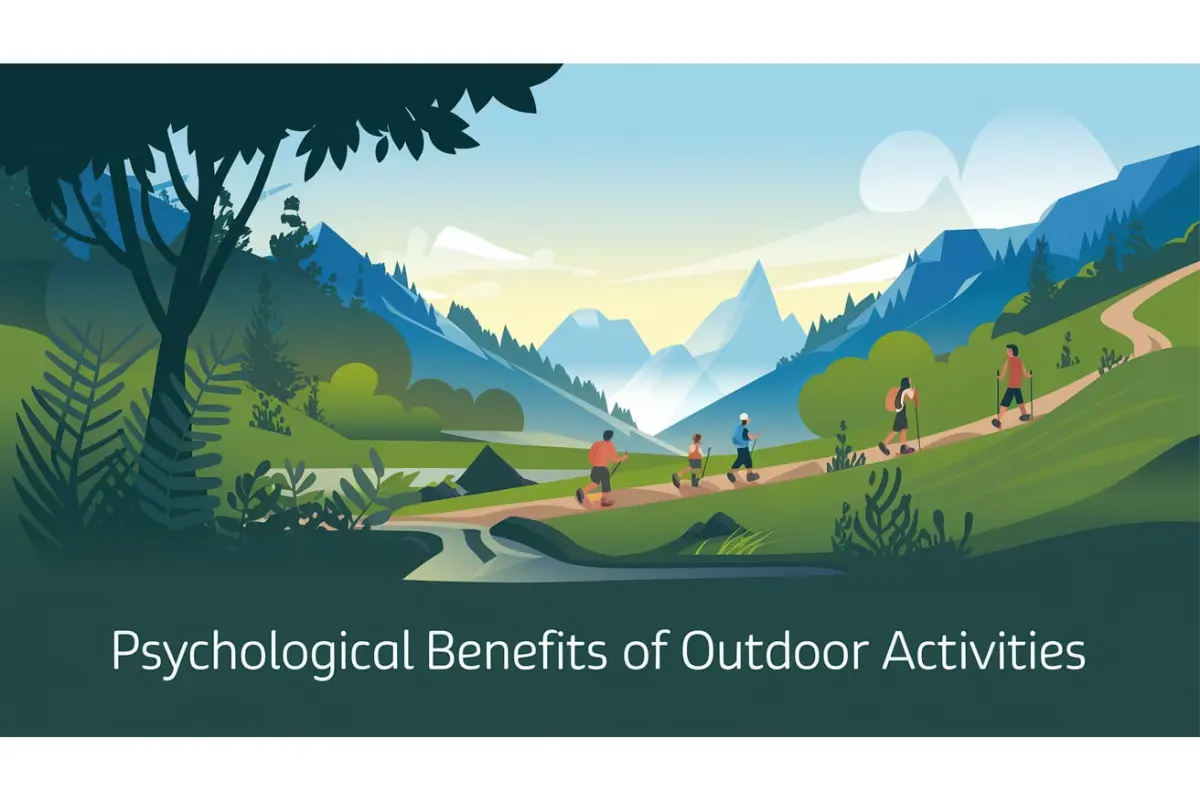Introduction: Nature’s Healing Touch
In today’s fast-paced, technology-driven world, spending time outdoors has become more important than ever. Beyond the physical advantages, outdoor activities offer significant psychological benefits that improve mental health, enhance emotional well-being, and foster a deeper connection with nature. This blog explores the transformative effects of outdoor activities and provides tips for incorporating nature into your daily life.
1. Stress Reduction and Relaxation
One of the most well-known benefits of outdoor activities is their ability to reduce stress.
How Nature Reduces Stress:
- Lower Cortisol Levels: Studies show that spending 20 minutes in nature lowers stress hormone levels.
- Mindful Connection: Outdoor activities like walking or gardening promote mindfulness, helping you focus on the present moment.
Example: Forest bathing, or shinrin-yoku, a Japanese practice of immersing oneself in nature, has been scientifically proven to lower stress and improve mood.
2. Improved Focus and Cognitive Function
Outdoor activities are also known to boost cognitive abilities and improve focus.
The Science Behind It:
- Attention Restoration Theory: Being in nature restores your ability to concentrate by giving your brain a break from constant stimulation.
- Boosted Creativity: Activities like hiking have been linked to a 50% increase in creativity, as shown in a study by Stanford University.
Pro Tip: Spending just an hour in a park can rejuvenate your mind and improve productivity.
3. Enhanced Mood and Emotional Well-Being
Nature has a profound impact on our emotional state.
Mood-Boosting Benefits:
- Release of Endorphins: Physical outdoor activities like jogging or biking trigger the release of endorphins, also known as the “feel-good” hormones.
- Combating Depression and Anxiety: Exposure to sunlight boosts serotonin levels, reducing symptoms of depression.
Stat Check: Research published in Frontiers in Psychology found that people who spent two hours a week in nature reported significantly better mental health.
4. Strengthened Social Connections
Outdoor activities provide an excellent opportunity to bond with others:
Benefits of Group Activities:
- Builds stronger social connections, which are key to mental well-being.
- Encourages teamwork and mutual support through activities like group hikes or community gardening.
5. Reduced Symptoms of ADHD in Children
For children, outdoor activities offer unique psychological advantages.
How Nature Helps Children:
- Improves attention spans, particularly in kids with ADHD.
- Encourages healthy emotional development through unstructured play.
Example: Schools implementing outdoor education programs have reported higher academic performance and better behavior among students.
6. Tips for Incorporating Outdoor Activities into Your Life
Integrating outdoor activities into your routine doesn’t have to be challenging.
Simple Ways to Get Started:
- Take a 30-minute walk in your local park during lunch breaks.
- Practice yoga or meditation outdoors to combine physical and mental relaxation.
- Plan weekend activities like hiking, cycling, or picnics with family and friends.
Pro Tip: If you’re short on time, even sitting by a window with a view of greenery can have calming effects.
7. Popular Outdoor Activities and Their Benefits
Different outdoor activities offer unique psychological benefits:
1. Hiking:
Boosts cardiovascular health while improving mood and reducing anxiety.
2. Gardening:
Provides a sense of accomplishment and lowers stress.
3. Camping:
Encourages digital detox and fosters a deeper connection with nature.
4. Water Activities:
Swimming, kayaking, and paddleboarding promote relaxation and enhance mood.
Further Reading: Discover more about the science behind nature’s impact on mental health.
8. Challenges to Spending Time Outdoors
Despite its benefits, many people face barriers to engaging in outdoor activities:
1. Lack of Time:
Busy schedules often make it difficult to prioritize outdoor activities.
- Solution: Start with small steps like a 10-minute walk.
2. Accessibility:
Urban areas may lack green spaces.
- Solution: Look for community gardens, rooftop spaces, or nearby trails.
3. Weather Constraints:
Extreme weather can deter outdoor activities.
- Solution: Dress appropriately for the weather and explore indoor nature-inspired activities like conservatories or botanical gardens.
Conclusion
Outdoor activities offer immense psychological benefits, from reducing stress and improving focus to boosting mood and strengthening social connections. By making nature a part of your daily routine, you can enhance your mental well-being and lead a more balanced, fulfilling life. Step outside today and let nature work its magic.













